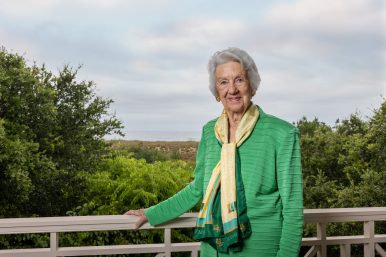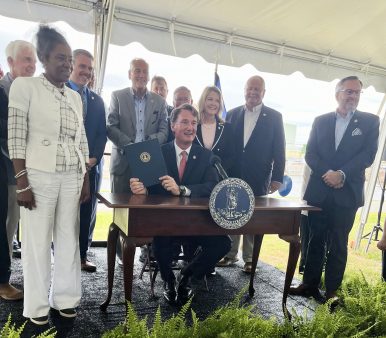Virginia regained its crown as the No. 1 state in CNBC’s annual America’s Top States for Business rankings released Thursday, winning the top spot for a record sixth time.
The cable business news network once again praised Virginia for having “the nation’s best education system and policies that give companies room — both literally and figuratively — to grow.” In particular, the Old Dominion ranked first place in the nation for education, third for infrastructure and fourth for artificial intelligence, with CNBC noting that the commonwealth is home to the world’s largest concentration of data centers, through which more than 70% of the world’s internet traffic travels.
“But where Virginia‘s infrastructure really shines is in the wealth of shovel-ready sites the state offers for companies that want to build fast,” the network said. “The state’s economic development arm has certified dozens of sites across the commonwealth, promising that all utilities and infrastructure can be in place within 18 months.”
Virginia ranked fifth for business friendliness, with CNBC noting that the commonwealth wasn’t “friendly enough” to land a pet project of Virginia Gov. Glenn Youngkin, a failed proposal to build a $2 billion arena in Alexandria for the Washington Capitals and Wizards. (Democratic state Sen. Louise Lucas, chairman of the Senate Finance and Appropriations Committee and a key opponent of the deal, tweeted Thursday, “We wouldn’t be the number one state for business if we had wasted billions of taxpayer dollars on a vanity arena project. You’re welcome Wannabe VP Pick for Tyrannical Trump.”)
CNBC also pointed out that though the commonwealth was ranked No. 9 in the nation for workforce, it has a problem with outmigration, with “too many workers moving out [and] not enough moving in.” And it noted that while the commonwealth is rich in data centers, that’s caused a strain on the state’s power grid.
Virginia scored 1,595 out of a possible 2,500 points in the network’s Top States study, finishing in the top 50% or better in each of 10 major categories. The commonwealth came in second to North Carolina in 2023, but this year, the two states switched positions, with North Carolina ranking second. In 2022, Virginia ranked third overall.
In 2021, Virginia took the top spot in the annual rankings of business-friendly states for a second, consecutive time. Virginia also won the top ranking in 2019, 2011, 2009 and 2007, the first year CNBC began ranking the states. CNBC did not rank the states in 2020 due to the pandemic.
“How exciting and what an honor it is to have CNBC here recognizing Virginia as the top state for business,” Virginia Gov. Glenn Youngkin said during a live interview from Virginia Beach on CNBC’s “Squawk Box” Thursday. “I think we work incredibly well together. Economic development is a team sport, and our administration has taken huge strides over the last 2 1/2 years to address some real areas of importance. Talent is always top of the list, and our talent accelerator is now rated the top talent accelerator in America.
“Business-ready sites and infrastructure continue to be a top need for businesses, and we’ve allocated $550 million over the last three years to make sure that we have shovel-ready sites. And then, finally, of course, power — our all-American, all-of-the above power plan is taking big strides. Yesterday, we announced a big step for a potential siting of a small modular reactor in Virginia to be the first.”
Youngkin added that he believes $5 billion in tax cuts in the first two years of his term were key to Virginia’s success in attracting and retaining companies. “We made Virginia’s business climate even better by streamlining regulations and cutting the red tape,” the governor said, adding that the state has 240,000 more people employed than it did before his term began in January 2022. He also noted that former members of the military — including 700,000 veterans living in Virginia — are “one of the things that make Virginia great.”
Asked if Virginia is in play this year in the presidential election, Youngkin said he believes it is, even though President Joe Biden won Virginia by 10 points over former President Donald Trump in 2020. “The next year,” the governor said, “we’re able to win it by two.” Youngkin bypassed a question about whether he believed he was still a possible Trump vice presidential candidate pick, but said he is “very enthusiastic about the prospects for President Trump and whoever he chooses as his running mate.”
Highlighting the state’s divided government, House of Delegates Speaker Don Scott lauded Youngkin and Democratic legislators Sen. Louise Lucas and Del. Luke Torian, who chair the two legislative bodies’ finance committees. “We invested in our future — our children. Virginia is back on top,” Scott tweeted. “We raised minimum wages and gave teachers pay raises! More importantly, we protected reproductive freedom and bodily autonomy.”
CNBC based this year’s rankings on 128 metrics — up from 86 last year — across 10 categories: workforce; infrastructure; cost of doing business; economy; life, health and inclusion; technology and innovation; business friendliness; education; access to capital; and cost of living. Infrastructure was the most heavily weighted category this year.
“With six wins — and three in the last five years — Virginia is our most decorated state. It’s easy to see why,” CNBC special correspondent Scott Cohn said. “In both Republican and Democratic administrations, the state has shown how much it cares about business, and how carefully it can listen to companies. Plus, year after year, Virginia offers the training, talent, and the infrastructure for success.”
According to CNBC, Texas, Georgia and Florida rounded out the top five spots in this year’s rankings.
“Being named America’s Top State for Business is a testament to the incredible progress being made throughout the Commonwealth, not least by the many thousands of businesses who call Virginia home,” Virginia Economic Development Partnership President and CEO Jason El Koubi said in a statement. “This recognition is years in the making, and I am incredibly grateful to all of our state, regional and local partners that contributed to this distinction.”
Barry DuVal, president and CEO of the Virginia Chamber of Commerce and a former state secretary of commerce and trade, issued a statement as well: “Virginia’s ranking as the Top State for Business reaffirms our conviction that Virginia is the premier state for business. It highlights our strong education system, availability of business-ready sites and Virginia’s commitment to economic development and a culture of innovation and entrepreneurship. This recognition also supports our strategic approach to grow Virginia’s position as the leading state for business through our targeted policy recommendations in Blueprint Virginia 2030.”
Another former state secretary of commerce and trade, Todd Haymore, now managing director of Hunton Andrews Kurth’s Global Economic Development, Commerce, and Government Relations Group, said, “Over 25 years in public and private sector economic development, I’ve learned that the fundamentals like education, workforce, infrastructure and site readiness are what really matter, and that is where Virginia shines. Virginia is back in the top spot because we invest in the fundamentals, maintain a bipartisan commitment to pro-growth and pro-business policies, and because we have really smart, talented people working to create jobs and opportunity, from the governor’s office to the legislature, and from VEDP all the way down to the local level.”
- First place — Education
- Third — Infrastructure
- Fifth — Business friendliness
- Eighth — Access to capital
- Ninth — Workforce
- 10th — Economy
- 15th — Technology and innovation
- 19th — Cost of living
- 19th — Quality of life
- 24th — Cost of doing business
Virginia Business Deputy Editor Kate Andrews contributed to this article.



